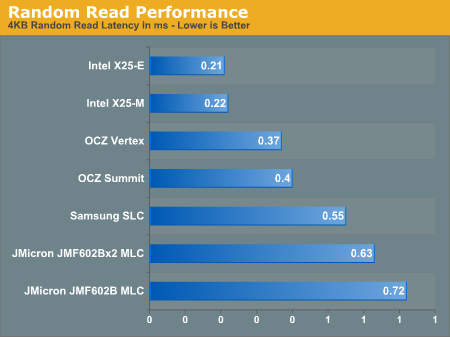The SSD Anthology: Understanding SSDs and New Drives from OCZ
by Anand Lal Shimpi on March 18, 2009 12:00 AM EST- Posted in
- Storage
SSD Aging: Read Speed is Largely Unaffected
Given the nature of the SSD performance-over-time “problem” you’d expect to only pay the performance penalty when writing files, not reading. And for once, I don’t have any weird exceptions to talk about - this is generally the case.
The table below shows sequential read performance for 2MB blocks on new vs. “used” SSDs. I even included data for a couple of the hard drives in the "Used" column; for those numbers I'm simply measuring transfer rates from the slowest parts of the platter:
| 2MB Sequential Read Speed | New | "Used" |
| Intel X25-E | 240.1 MB/s | |
| Intel X25-M | 264.1 MB/s | 230.2 MB/s |
| JMicron JMF602B MLC | 134.7 MB/s | 134.7 MB/s |
| JMicron JMF602Bx2 MLC | 164.1 MB/s | 164.1 MB/s |
| OCZ Summit | 248.6 MB/s | 208.6 MB/s |
| OCZ Vertex | 257.8 MB/s | 250.1 MB/s |
| Samsung SLC | 101.4 MB/s | |
| Seagate Momentus 5400.6 | 77.9 MB/s | - |
| Western Digital Caviar SE16 | 104.6 MB/s | 54.3 MB/s |
| Western Digital VelociRaptor | 118.0 MB/s | 79.2 MB/s |
The best SSDs still transfer data at over 2x the rate of the VelociRaptor.
Read latency is also extremely good on these worn SSDs:

I left the conventional hard drives out of the chart simply because they completely screw up the scale. The VelociRaptor has a latency of 7.2ms in this iometer test with a queue depth of 3 IOs; that's an order of magnitude slower than the slowest SSD here.
Since you only pay the overhead penalty when you go to write to a previously-written block, the performance degradation only really occurs when you’re writing - not when you’re reading.
Now your OS is always writing to your drive, and that’s why we see a performance impact even if you’re just launching applications and opening files and such, but the penalty is much less tangible when it comes to read performance.










250 Comments
View All Comments
strikeback03 - Thursday, March 19, 2009 - link
If you get Newegg's specials, one of the codes is for the 30GB for $103 with a $20MIR, so $83 with shipping if the rebate comes through. At the size I would want (~120) the Super Talent undercuts the OCZ slightly.Does anyone know if you can install the firmware of one maker to another maker's SSD? For example, assuming both the Ultradrive ME and the Vertex use the same Indilinx controller, and say Super Talent chose to release it with the firmware which optimizes for higher sequential speeds, would the user be able to choose the firmware which optimizes for less latency?
Testtest - Wednesday, March 18, 2009 - link
Ah, no editing?!A-Data's "300 plus" SSD also uses the Indilinx controller.
vailr - Wednesday, March 18, 2009 - link
"The Anatomy of a SSD" should instead read: "The Anatomy of an SSD"Flunk - Wednesday, March 18, 2009 - link
Yes, because S is a vowel...abudd - Wednesday, March 18, 2009 - link
Assuming SSD = "es-es-dee" then "an SSD" is right. If it *sounds* like a vowel, use "an".JarredWalton - Wednesday, March 18, 2009 - link
Yes, *but* SSD could also be read as "Solid State Drive" instead of "ess ess dee", in which case you would say "a SSD". I tend to read it as "ess ess dee", but Anand thinks of those letters as "Solid State Drive".Potato, potato, tomato, tomato... let's call the whole thing off!
Azsen - Thursday, March 19, 2009 - link
When reading acronyms you're supposed to think of them as the letters, i.e. when you see RAM, you think "ram" straight off not Random Access Memory. When you see "IBM" you think "eye bee emm" not International Business Machines etc etc. It would take ages to read an article if you had to stop and think out all the full wording of acronyms as you're reading them.I'm going with the correction of "Anatomy of an SSD". Correct English fullstop.
JarredWalton - Thursday, March 19, 2009 - link
By your comment, you suggest two different things, and that's really okay. That was my point: when you see "RAM" you probably thing "ram" as in the animal... not "Are A Em". You say "a RAM stick" not "an RAM stick". I'd guess most people think of SATA as "Ess A Tee A", but if you talk to most computer techs that are in the know, it's "say-te" so you would say "a SATA drive".And you know, I'm sure plenty of people will agree with the correct way of saying SATA, and that's perfectly okay. English really is a very flexible thing - particularly in the tech world - and rarely is there an "always right" way of saying things. If Anand wants to say "a SSD" and others want to say "an SSD", I'm not going to try to declare one group or the other correct. They both are, depending on your viewpoint.
"I believe the world is neither black nor white, but only shades of gray."
Pythias - Friday, March 20, 2009 - link
Can't have gray without black and white.7Enigma - Wednesday, March 18, 2009 - link
HAHAHA. What a tool. I love it when people critique grammar.....and get it wrong.